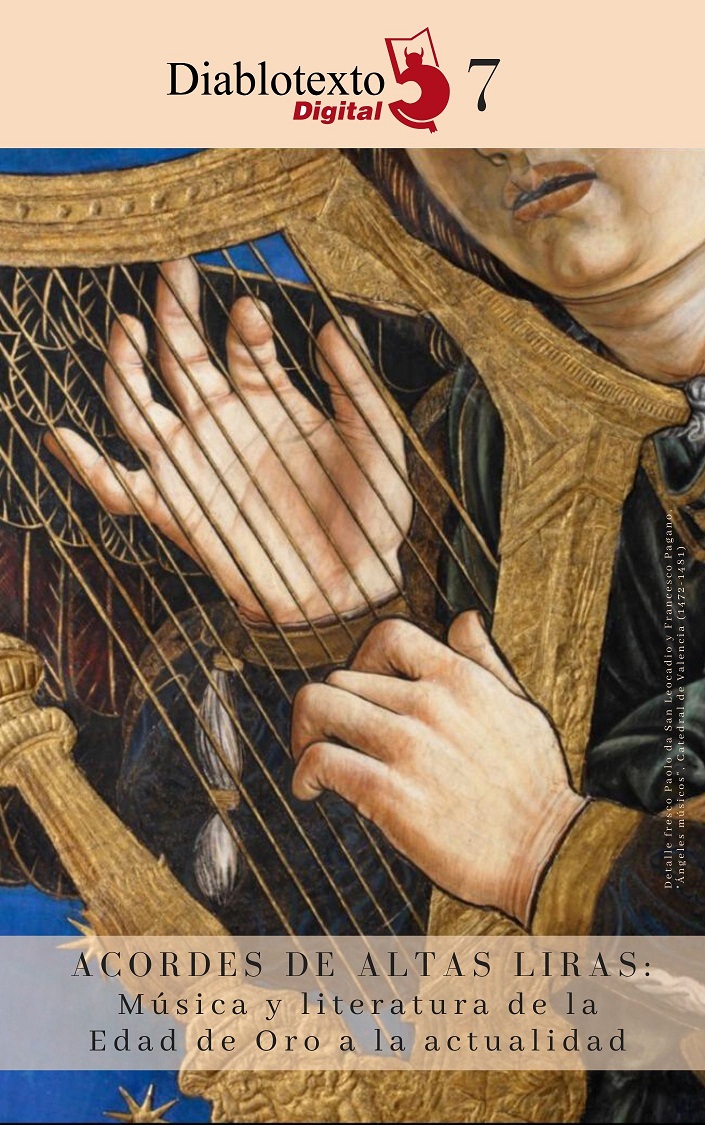Notes for the zarzuela edition Los cielos premian desdenes by Marcos de Lanuza, Count of Clavijo, and anonymous composer
DOI:
https://doi.org/10.7203/diablotexto.7.16691Keywords:
Marcos de Lanuza, Count of Clavijo, zarzuelas, music and poetry, musical theatre, XVIIth Century Abstract
Abstract
Marcos de Lanuza, Count of Clavijo, is one of the least known playwrights and, nevertheless, with great effort worked for the artistic excellence of the musical theatre of his time. From its three known zarzuelas, and still unpublished, we have chosen Júpiter y Ío. Los cielos premian desdenes for being the most suggestive in terms of the relationship between dramatic poetry and music. He wrote it by order of Carlos II for the Shrovetide of 1699, and wanted to take Ovid's Metamorphoses (I) as a pretext for the plot, but adapting the love of the gods to a moralizing outcome that is included in the subtitle and that, at the same time, reveals the homage to the zarzuela Los celos hacen estrellas that Vélez de Guevara represented in the palace in 1672. The score is kept manuscript and anonymous, although we dare to shuffle the names of Sebastián Durón, Juan de Navas and Antonio Literes as possible composers. Musically, it contains the elements characteristic of the human baroque tone, together with the stylistic novelties imported from Italy, which make up a discourse ruled by fragments with four voices alternated with others alone (couplets and recitations), and with accompaniment of violins, violas, flutes and bugles, and the relevant continuous bass. The objective of this short article is to make known this zarzuela and lay the foundations for its critical edition for Digital CSIC, the institutional repository of the CSIC.
 Downloads
Downloads
 References
References
Becker, Danièle (1989). “El teatro palaciego y la música en la segunda mitad del siglo XVII”. En: Actas del IX Congreso de la Asociación Internacional de Hispanistas. Sebastian Neumeister (ed.). Frankfurt am Main: Vervuert Verlag.
Caballero Fernández-Rufete, Carmelo (2001). “En trova de lo humano a lo divino. Las óperas de Calderón de la Barca y los villancicos de Miguel Gómez Camargo”. En: La ópera en España e Hispanoamérica. Emilio Casares Rodicio y Álvaro Torrente (eds.). Madrid: Instituto Complutense de Ciencias Musicales.
Durón, Sebastián y Cañizares, José de (1979). Salir el amor del mundo. Edición de Antonio Martín Moreno. Málaga: Sociedad Española de Musicología.
Flórez, María Asunción (2006). Música teatral en el Madrid de los Austrias durante el Siglo de Oro. Madrid: ICCMU.
Josa, Lola - Lambea, Mariano (2013). “Duelos de ingenio y fortuna. Antonio de Bances Candamo - Juan de Navas. Transcripción poético-musical”. En: Digital CSIC.
http://hdl.handle.net/10261/65904 [consulta: 22-11-2019].
Lambea, Mariano, Josa, Lola y Valdivia, Francisco A. (2016). Nuevo Íncipit de Poesía Española Musicada (NIPEM). En: Digital CSIC.
http://hdl.handle.net/10261/161471 [consulta: 22-11-2019].
Ortega, Judith (2002). “Marcos de Lanuza”. En: Diccionario de la Zarzuela. Madrid: ICCMU, vol. 2.
Rojo Alique, Pedro C. (2008). “Notas sobre don Marcos de Lanuza y Arellano, Conde de Clavijo”. En: Criticón, 103-104, pp. 171-206.
Sabik, Kazimierz (1992). “El teatro de tema mitológico de Marcos de Lanuza, Conde de Clavijo, en la corte de Carlos II”. En: Actas del X Congreso de la Asociación Internacional de Hispanistas. Barcelona: PPU, vol. II. pp. 1085-1096.
Stein, Louise K. (2002a). “Juan de Serquiera”. En: Diccionario de la Música Española e Hispanoamericana. Madrid: SGAE, vol. 9.
Stein, Louise K. (2002b). “Manuel de Villaflor”. En: Diccionario de la Música Española e Hispanoamericana. Madrid: SGAE, vol. 10.
Stein, Louise K. (1993). Songs of Mortals, Dialogues of the Gods. Oxford: Clarendon Press.
Valls, Francesc (2017). Mapa Armónico Práctico. Transcripción de Mariano Lambea con la colaboración de Bernat Cabré. En: Digital CSIC, <http://hdl.handle.net/10261/144450> [consulta 22-11-2019].
Valls, Francesc (2002). Mapa Armónico Práctico. Edición facsímil de Josep Pavia i Simó. Barcelona: CSIC.
Vélez de Guevara, Juan (1970). Los celos hacen estrellas. Edición de J. E. Varey y N. D. Shergold con un estudio de la música por Jack Sage. London: Tamesis Books Limited.
Downloads
Published
How to Cite
-
Abstract479
-
PDF (Español)477
Issue
Section
License
Licencia de reconocimiento de Creative Commons “Reconocimiento - No Comercia l- Sin Obra Derivada
Authors who publish with this journal agree to the following items:
The authors will keep their copyright and guarantee the journal the right of first publication of their work, which will be simultaneously subject to the Creative Commons license that allows third parties to share the work indicating its author and its first publication in the journal. The authors may adopt other non-exclusive license agreements to distribute the version of the published work (e.g., depositing it in an institutional telematic file or publishing it in a monographic volume), with an acknowledgment of its initial publication in this journal. The authors are allowed and encouraged to disseminate their work through the Internet (e.g., in institutional telematic archives or on their website) before and during the submission process, which can produce interesting exchanges and increase citations of the published work. (See Effect of Open Access)




